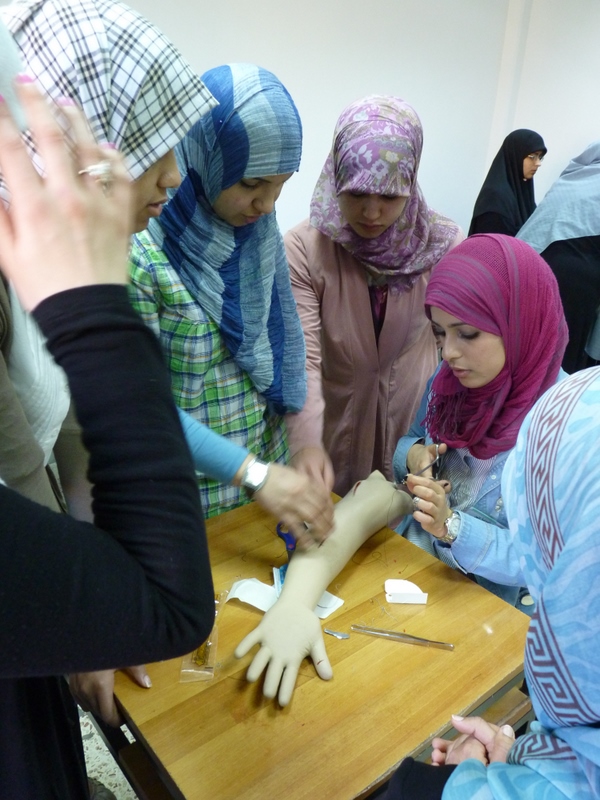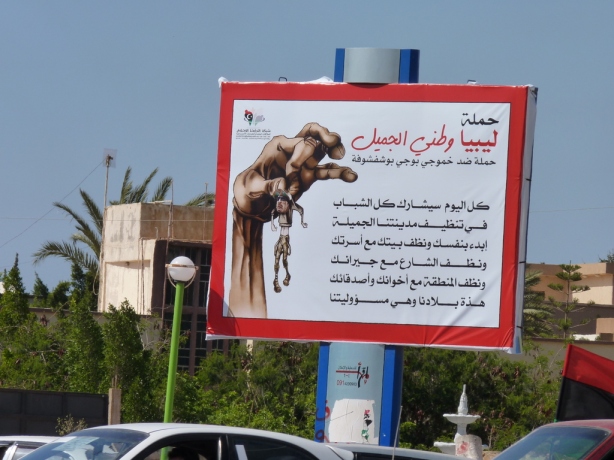
Dr. Shawg Najem volunteers at the Libyan International Medical University, teaching suturing in an emergency first-aid course
A version of this article appears in Foreign Policy.
BENGHAZI, Libya —If you had told Benghazi residents three months ago that they would be throwing Molotov cocktails at Gaddafi loyalist tanks, they would’ve looked at you like you were crazy. Even after the Egyptian revolution began on January 25, Gaddafi’s iron grip on Libyan society seemed too strong to allow an uprising of the sort that occurred in Tunis and Cairo. In early February, Ahmed, a 26-year-old medical student, heard about a joke that was making the rounds in recently liberated Tunisia. “The Tunisians were telling us Libyans to bend over so they could see the real men over in Egypt.”
The problem of social organization during a crisis no one expected
It’s not surprising, then, that when the revolution happened, few people here had much of an idea about what to do next: how to keep a society dominated by the government sector running once that sector was gone. Just as the opposition’s Transitional National Council (TNC) has faced the problem of managing its volunteer-heavy rebel army, people trying to manage quotidian aspects of life during the war faced the problem of what to do with the thousands of volunteers who want to help but don’t have anyone giving orders. This is true in medical care, aid distribution, and other state services: while the TNC has managed to restore many of the functions of government previously handled by the Gaddafi regime, volunteers continue to shoulder much of the burden.
In the revolution’s early days in February, civilians handled matters as basic as policing and traffic management. With traffic lights not working, ordinary Libyans stood at intersections and directed traffic without pay. They also formed neighborhood watch groups to patrol their neighborhoods. More recently, the TNC has restored police functions in Benghazi, largely through an organ called National Security (Al-Amn Al-Watani). Essentially a revamped police force, it includes many of the same police officers who patrolled Benghazi’s streets before the revolution — those who have passed a screening by the new government.
Nevertheless, some citizens still feel ill at ease on Benghazi’s streets, especially as rumors of lurking Revolutionary Committee cells — the ideologically devoted Gaddafi loyalists — abound. “I don’t feel like there’s proper policing,” says Farah El-Sanousi, a 20-year-old dental student. “I don’t feel safe.” Near Benghazi’s Hawari Hospital, she explains, “the traffic lights aren’t working, and ordinary people are directing traffic.”
Enas Mahmoud, 20 years old and also a dental student, worries about going out as well. “There’s always fear — going out of the house, going places,” she says. “Especially after sunset.” State and society focus on the threat to women in particular; Libya Hurra TV, the opposition’s channel, has advised that women stay home between 6 p.m. and 7 a.m.
Others see a mixed picture when it comes to public safety during the revolution. Dr. Shawg Najem, a 26-year-old anesthesiologist who is volunteering to teach first aid to adults, gets calls from her parents all the time when she’s away from home — they want to make sure she’s safe. “It’s because of the lijan al-thawriyah [Revolutionary Committees],” she says. “They’re crazy, and you never know what they’re going to do. But other than that, I feel safer now, after the revolution.” She describes taking a walk with her mother in the center of town recently, without a male family member accompanying them. “Before the revolution, we couldn’t do that,” she said. “It wasn’t so safe for women to do that by themselves anywhere other than one of [Benghazi’s] shopping streets. Now, we can walk side-by-side with men.”
Nuha Naas, the 36-year-old chemist at Libyan International Medical University who helped organize LIMU’s first-aid program, recalls the first days of the revolution in Benghazi — February 17‒20, when unarmed demonstrators were being shot by Gaddafi’s security forces and stormed government security buildings, taking heavy fire. She called doctors she knew at the city’s Jala Hospital and the Benghazi Medical Center, who asked her to come join the many volunteers already helping.
“When I got to the hospitals, everything was a mess,” Naas recalls. “There was no one to tell us how to help.” The volunteers did their best to figure it out on their own what help was needed. “We cleaned blood off the floor, carried food, made beds for patients, took people to get X-rays.”
This lack of organization in a time of crisis gave Naas the idea for the first-aid course at LIMU that she now manages, which has taught basic medical response techniques to over 600 people. “I saw lots of medical students [at

A public-service announcement tells Benghazi residents to keep their city clean. The "trash" shown in the ad is Gaddafi.
the hospitals] who could be more helpful, but who didn’t know what to do,” she says. “And I saw people on television carrying wounded patients or trying to stop bleeding,” she added, “but they were doing it the wrong way.”
The other face of unexpected chaos: a cathartic wellspring of spontaneous goodwill
Despite the disorganization, Nuha also witnessed solidarity and courage during those critical days in February — more than she had ever seen in her life. “It was amazing,” she says.
But the spontaneous upwelling of goodwill in the early days of the fighting was a powerful antidote to the disorganization. “Doctors and volunteers were treating the wounded, while singing to them and encouraging them at the same time — [saying] things about Libya, about freedom, about Gaddafi leaving,” Naas says.
Even the wounded were upbeat: “They were being brought in, covered in blood, looking miserable, but even they were doing this,” she recalls, making the opposition’s V-for-victory sign with her fingers. “I never thought that I would live to see these things.”
Everyone in opposition-held territory seems to have a story about how much nicer people are to one another now that Gaddafi is gone. “Before the revolution, you’d go out into the street and find a bunch of angry people,” says Shawg, the anesthesiologist. “They’d be taking it out on each other — you’d find a lot of fights on the street, people saying bad stuff to each other, or even [getting angry at one another while] driving. Sometimes you’d find people just fighting for the sake of fighting. Everyone was in a bad mood, all the time.”
“But after the revolution,” she continues, “we discovered that all the anger, all the negative feelings … were toward Muammar [Gaddafi] and his system. We discovered that we don’t have problems with each other — we only have a problem with the system, not with our neighbor or the guy in the market.”
The goodwill extended to taking pride in the city. Mardiya El-Fakhery, a 28-year–old anesthesiologist, recalls that before the revolution, “you’d never see Libyan boys cleaning up the street and taking ownership [of their city]. People had the attitude that [Benghazi] is already [dirty], so just let it go.” But as soon as the revolution began, she saw young boys and old men taking to the streets with brooms. The opposition government has sought to build on this goodwill around the territory their control, posting billboards throughout eastern Libya exhorting citizens to keep their cities clean. One such billboard (pictured above), featuring a giant hand holding a cartoon Qaddafi by the scruff of his neck as if he were a used tissue, reads:
Every day, all of the youth will participate in cleaning our beautiful city, starting with you yourself and your own house, with your family, as well as cleaning the street with your neighbors and cleaning the area with your brothers and friends. This is our country, and it’s our responsibility.
Frustration with Libya’s medical system turns into appreciation for its doctors
But nowhere is the new goodwill more clearly on display than in Libya’s hospitals. Under Gaddafi’s rule, the dilapidated medical system had become an infuriating symbol of the spotty distribution of resources in the country. Mohammed, who trades in used cars, is typical: He told me he had to pay thousands of dollars out of pocket to take his ailing mother to Tunisia, where better medical facilities are available. Noting Libya’s oil wealth, he asked, “Why can’t my country pay for decent hospitals? My mother should be able to get treatment here in Libya.” He then took out his phone and showed me a video of his elderly mother, grimacing in pain before she went to Tunisia for treatment. She died soon thereafter.
Before the revolution, some Libyans, unable to find adequate medical care in their own country, took their frustrations out on Libya’s doctors. “Just a few months ago,” remembers El-Fakhery, the anesthesiologist, “people hated Libyan doctors. They’d run off to Tunisia or Egypt for something as simple as a common cold.” She recalls that a surgeon at her hospital was even physically attacked after a failed surgery. “We didn’t have the facilities [to provide proper care],” she says.
But with the revolution, people in Benghazi began showing an outpouring of support for their doctors. She recalls how on March 19, as Gaddafi’s tanks were rolling through Benghazi’s streets and Revolutionary Committee members were shooting at civilians, she and other doctors were overwhelmed by the number of wounded they had to treat — and by the kindness that ordinary citizens were showing them. “In the hospital, men as old as my father would run around the ICU [Intensive Care Unit] at Jala Hospital [in Benghazi], passing out milk and juice and boxes of dates to the doctors,” she says. “They’d stuff them in the pockets of my lab coat and shake my hands, and they’d hug the male doctors. They’d bring pillows and blankets from home, giving everything they could to the hospital.”
“It’s funny,” says Mardiya, “but he” — Gaddafi — “brought out the best in us.”
Charles Homans contributed to this article.
Great article Ryan. Made tears well up! Thanks for the work you’re doing.
[…] “It’s funny, but Gaddafi brought out the best in us”: Social solidarity and the Libyan revolut… […]
[…] Social solidarity in the midst of revolution. […]